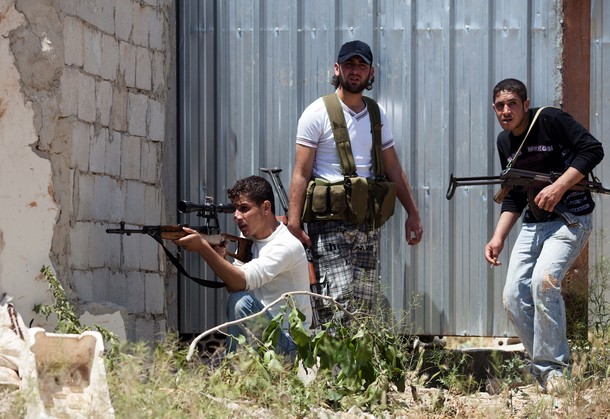
From Neil MacFarquhar, the New York Times: The onetime ragtag militias of the Syrian opposition are developing into a more effective fighting force with the help of an increasingly sophisticated network of activists here in southern Turkey that is smuggling crucial supplies across the border, including weapons, communications gear, field hospitals and even salaries for soldiers who defect.
The network reflects an effort to forge an opposition movement linking military, governmental and humanitarian organizations, that together can not only defeat the vastly superior military of President Bashar al-Assad, but also replace his government.
While it is far too early to speak of a state within a state, the rising sophistication of the effort underscores the evolving nature of the conflict and how control over the north and northwestern areas of the country is slowly slipping away from the government.
The network is emerging at a time of heightened tensions with Turkey and amid reports of multiple defections of high-ranking officers from the Syrian Army, many of whom are now helping the opposition. Turkey will sit down on Tuesday with its NATO allies to discuss a response to the downing of one of its warplanes by Syrian gunners, while on Monday Turkey reported that a general and two colonels had defected from Syria on Sunday, bringing the total to more than a dozen.
The undertaking by the opposition here constitutes more than just ferrying much-needed supplies. The larger, more elusive goal is to create cohesion and cooperation between the scattered militias that constitute the Free Syrian Army, as well as whatever local civilian rule has emerged.
There are now 10 military councils inside Syria, activists said, incorporating virtually every important town or rural area in revolt, with the notable exception of Homs, where factional differences continue to stymie unity. Activists working with the Syrian National Council, the main Syrian exile group, issue monthly pay packets, starting at $200 per soldier, with more for officers as well as a stipend for the families of those killed.
The money, said the activists, helps ensure the discipline among the military councils needed to engineer more choreographed attacks on the Assad military, rather than random acts of sabotage. “Military operations need to become more strategic,” said Hasan Kasem, 31, an activist who fled Aleppo, Syria, in February when he was summoned for military service. . . .
Mr. Kasem described how military leaders have divided Aleppo and areas west toward the Turkish border into five sectors under an overall military council called the Northern Free Brigades. “The group has changed from a voluntary military group into an actual body, a much more organized military structure,” Mr. Kasem said. “They either had to become an organized army, or become a gang.”
The opposition effort now also involves shipping weapons that can challenge tanks. “It is not a decisive strategy yet, it is just an attempt to tinker with the military balance,” said one member of the Syrian National Council, speaking on the condition of anonymity because weapons smuggling is a secretive issue.
Western governments have been reluctant to provide the opposition with large quantities of sophisticated weapons for fear they will fall into the wrong hands. Apparently aware of that concern, opposition officials say the recipients are carefully evaluated. “We need to vet people,” said one official, who was not authorized to speak publicly. “You don’t want to provide equipment to people you don’t know. . . .”
American officials and Arab intelligence officers said a small unit of the Central Intelligence Agency was operating here, vetting who gets better arms. But it has not gone inside, the sources said. (photo: Getty)
Image: getty%206%2026%2012%20FSA.jpg
